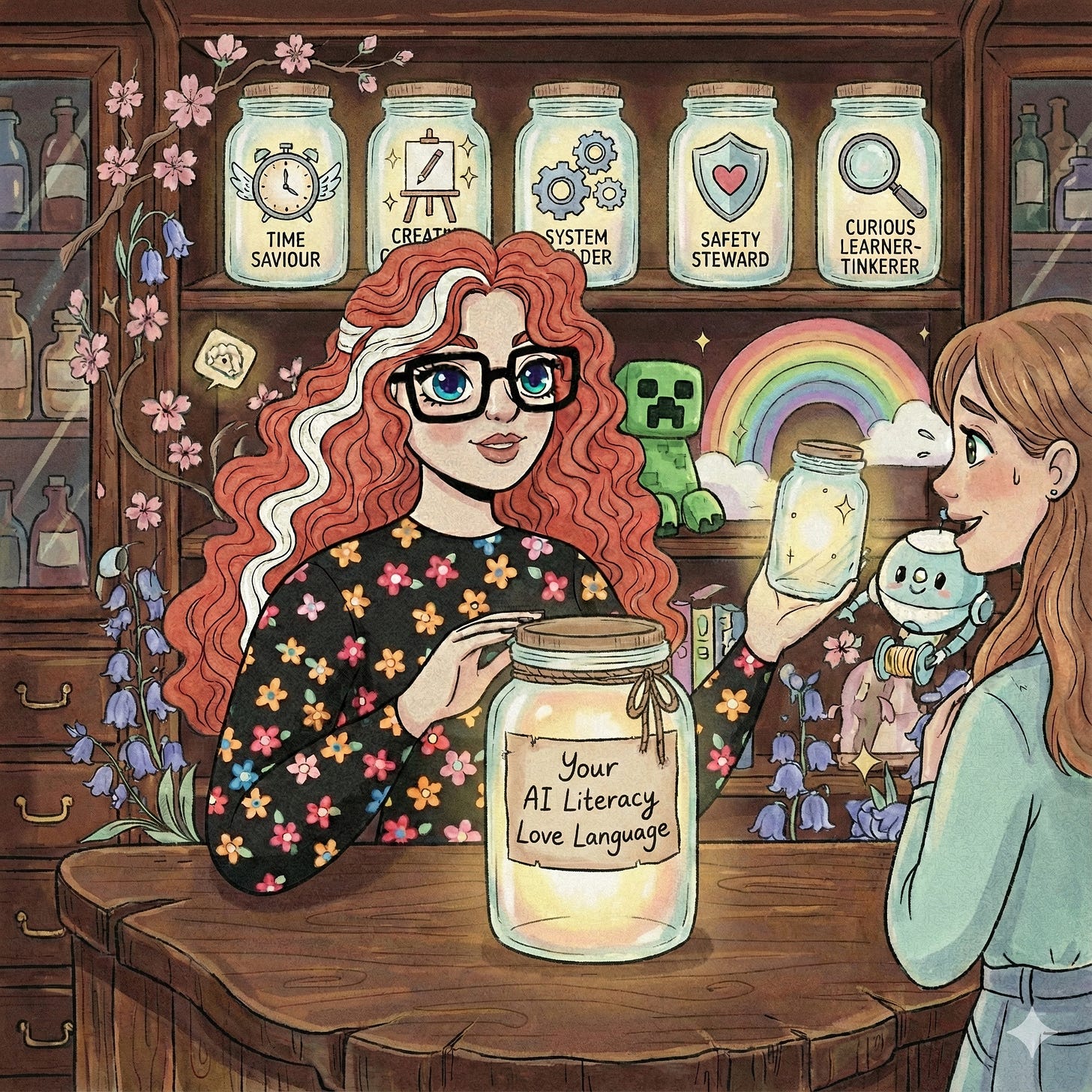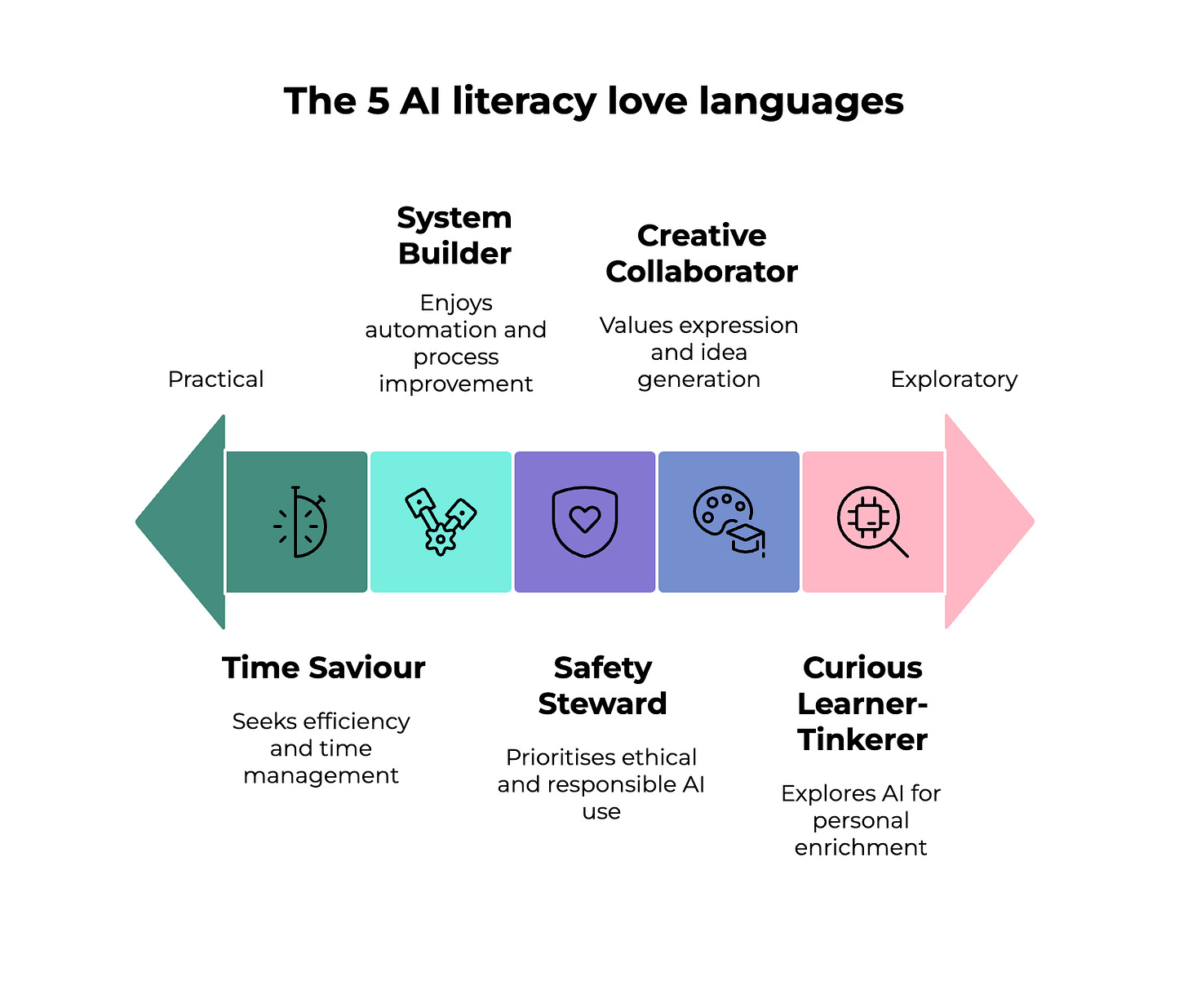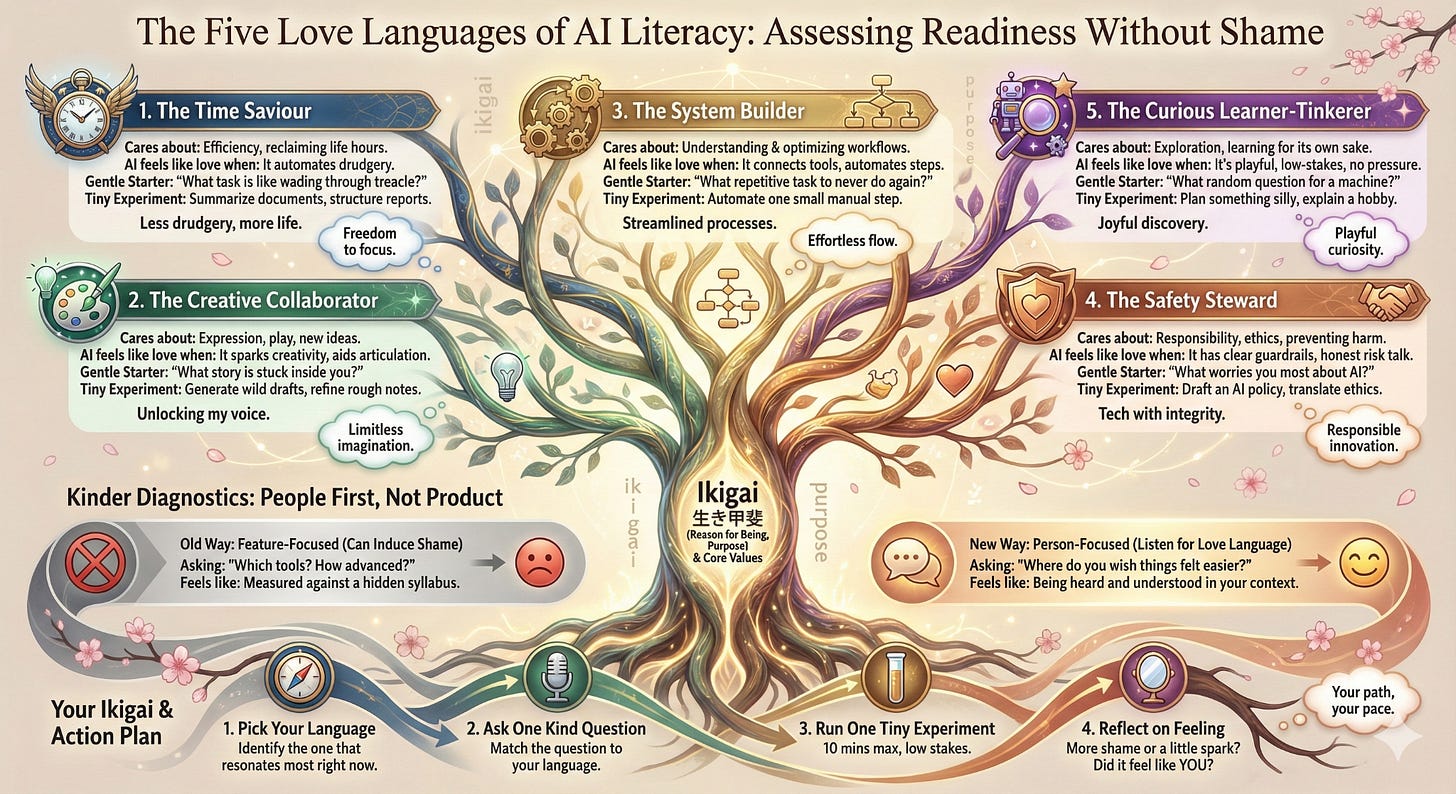The Five Love Languages Of AI Literacy
How to assess and diagnose AI readiness without creating shame
🌸 ikigai 生き甲斐 is a reason for being, your purpose in life – from the Japanese iki 生き meaning life and gai 甲斐 meaning worth 🌸
Someone I used to work with many moons ago messaged me this week;
“I’m looking to start skilling up in AI… what should I read, what courses should I do, what should I focus on?”
They also added a line that made my stomach flip a tad;
“I see you’re the AI guru on the Island…”
No pressure then.
I replied with what I thought were helpful diagnostic questions:
How often are you using AI and which tools?
Are you paying for any AI tools?
Have you used Deep Research mode?
Do you flick to thinking mode, and if so, why?
Have you customised any tools or loaded your own files in?
And then I asked where they wanted to get to; technical builder? confident AI champion? something else?
Their response was honest and a bit heartbreaking;
“I’d say I’m a complete novice… Looking at the questions you asked I can see I haven’t even scratched the surface.”
Ouch. Nothing in their reply made me feel that I was supporting or empowering them.
The vibe was more, “Oh. I guess I’m miles behind.”
That message has been rattling around in my head all week, because it reminded me how challenging it can be to convey tone and meaning over text, but also how language choice can mean the difference between motivation or putting someone off.
Perhaps we need to learn a literacy love language.
AI shame, softly spoken
When we’re excited about something, we tend to ask questions that make sense to us.
If you’re the sort of person who enjoys tweaking settings and obsessing over features, of course your first instinct is to ask, “Have you tried Deep Research?” or “Have you built a custom bot?”
But to someone at the start of their journey, those questions can quietly translate to;
“You’re behind”
“There’s a secret club and you’re not in it”
“You haven’t done the homework everyone else has apparently done”
That’s AI shame. And it doesn’t matter how warm your tone is... shame isn’t a helpful emotion, it makes people freeze.
So instead of asking, “How advanced are you?” it might be better to start with:
“Where in your life do you wish things felt easier, lighter or more fun?”
Which brings me to the idea that’s been forming in my head this week.
Maybe AI literacy has love languages.
The five love languages of AI
Gary Chapman’s original love languages framework helped couples understand that people experience and express love differently. One person feels loved through acts of service, another through quality time. Neither is wrong... they’re just speaking different languages.
What if the same applies to AI upskilling adoption?
When my friend said they wanted “enough experience in AI to get a job”, maybe in prompt optimisation, maybe building simple workflows… what I heard was someone whose love language is mastery and building. That’s just one way of relating to AI. There are others.
Here’s my current working list (subject to future nerdy tinkering, obviously);
1. The Time Saviour
What they care about: Getting an hour of their life back, not learning tech for tech’s sake.
AI feels like love when: It takes something heavy off their plate.
Gentle starter questions:
“What’s a task you do regularly that feels like wading through treacle?”
“Can we get AI to do the boring report structuring and formatting, so you just add your knowledge?”
Tiny experiment: Ask an AI tool to turn a messy bullet list into a clear email, or to summarise a long document you’ve been avoiding.
2. The Creative Collaborator
What they care about: Expression, play, new ideas.
AI feels like love when: It helps them say the thing they can feel but can’t quite phrase.
Gentle starter questions:
“Is there a story, talk or post you’ve been putting off because you don’t know how to start?”
“What would feel fun to explore with a robot today?”
Tiny experiment: Ask AI to give you three paragraphs in wildly different styles, or to turn your rough notes into a first draft you can argue with and see your voice and angle emerge.
3. The System Builder
What they care about: Understanding how things work and improving them.
AI feels like love when: It lets them stitch tools together, automate steps and see workflows come to life.
Gentle starter questions:
“What repetitive task do you secretly want to never do manually again?”
“Is there a little ‘if this, then that’ routine in your day we could experiment on?”
Tiny experiment: Use AI plus a simple automation to remove one small manual step from your week.
4. The Safety Steward
What they care about: Doing the right thing, not harming people, making sure tech is used responsibly.
AI feels like love when: It comes with guardrails and honest conversations about risk.
Gentle starter questions:
“What worries you most about AI in your context, e.g. privacy, bias, job impact?”
“Where do you feel responsible for the wellbeing of others when AI is involved?”
Tiny experiment: Ask an AI tool to help you write a simple AI use policy for your team, or to translate a dense ethics guideline into plain language you can actually use.
5. The Curious Learner-Tinkerer
What they care about: Exploration, learning for its own sake, no strings attached.
AI feels like love when: It’s low stakes and playful, not tied to performance reviews or productivity metrics.
Gentle starter questions:
“If this wasn’t about work at all, what would you be curious to try with AI?”
“What’s a random question you’ve always wanted to ask a machine?”
Tiny experiment: Use AI to plan something silly and joyful. A treasure hunt for your kids. A fantasy dinner party guest list with conversation prompts. An explanation of your favourite hobby that you could share with beginners. Let yourself play.
Kinder diagnostics start with people, not product
Looking back at my original questions to my friend, I can see what I was doing.
I was trying to quickly gauge “level” by scanning for features and tools;
Have you paid for anything?
Used Deep Research?
Built custom stuff?
That’s fine if you’re talking to someone who’s already in System Builder mode, who lights up at technical specifications and workflow diagrams.
But if their love language is Time Saviour or Creative Collaborator, they might not care about features first. They care about feeling less exhausted, less blocked, less stuck.
I care deeply about helping as many people as possible, and when we don’t know people’s existing skill or motivation levels, it doesn’t hurt to be as human as possible in how we talk about AI literacy;
Instead of: “Which AI tools do you use and how often?” I’m practising: “What do you wish felt 10% easier in your day?”
Instead of: “Have you used Deep Research or custom knowledge bases yet?” I’m asking: “When did a piece of tech last make you think, ‘oh, that just saved my sanity’?”
The first version might feel more like being measured against a hidden syllabus.
The second version listens for their love language, what really matters to them.
Ikigai, AI and not losing yourself
There’s a reason this matters to me more than just a drive to be a better tech explainer.
If AI is going to be a big part of our working lives, then how we enter that relationship matters deeply.
Your ikigai, your reason for being, is unlikely to be “use AI as much as possible”.
Your ikigai is the life you’re trying to build… the people you want to help, the kind of work that feels good in your bones, the impact you want to have, the person you’re becoming.
AI literacy should support that, not replace or detract from it.
If you feel ikigai when caring for people, maybe your AI love language is Safety Steward… learning enough to protect patients, learners, or clients whilst the technology evolves around you.
If your ikigai is storytelling, Creative Collaborator and Curious Learner might be the pathways that make you grin rather than grind.
If your ikigai is systems change, System Builder and Time Saviour might help you design better services, not just prettier slide decks.
The point is that you don’t have to become someone else to “get into AI”.
You can learn to speak AI in the language of who you already are.
I think about this when I’m teaching workshops or consulting with organisations. The people and businesses thriving with AI aren’t the ones who abandon their values and adopt Silicon Valley hustle culture…they’re the ones who stay grounded in their purpose and use AI to amplify what already matters to them.
The ones who fail? Often they’re trying to become something they’re not, chasing someone else’s definition of AI literacy.
A tiny invitation
My friend wants to “get a job in AI”, optimising workflows. That’s System Builder language, and I should have recognised it immediately. But instead of starting with “what’s a process you’re proud of making better?” I jumped straight to feature checklists. I made them feel behind when I could have helped them see they were already halfway there, met them in their love language of needing a problem worth solving and permission to experiment.
So if you’ve also been telling yourself, “I’m a complete novice, I haven’t even scratched the surface”… pause.
You can get to exactly where you need or want to, when you find support written in your language.
Try this:
Step 1: Pick the love language that sounds most like you right now.
Step 2: Ask one small, kind question that matches it.
Step 3: Run one tiny experiment this week, ten minutes max.
Step 4: Notice how you feel afterwards, more shame, or a little spark of “oh, I could do this”?
That quiet feeling of “I can do this”, matters far more than the number of skills you can tick off.
And if no one’s asked you in the right language before... maybe this is your sign to start translating your own AI skill story into one that fits your life, not somebody else’s syllabus. (Though do reach out to trusted people to brainstorm with, and if I’m the only one you know then send me a message, I’ll gladly arrange a call and try hard to not feature dump at you *grin*)
Which AI literacy love language feels most like home to you right now? I’d genuinely love to hear in the comments.
Sarah, seeking ikigai xxx
PS – Bullet journal spread “My AI Literacy Love Language”
Create a page with these sections:
The language that lights me up: Which of the five resonates most? (You can have more than one, but start with your primary)
What I’m curious about: In my love language, what would I want to explore first?
My tiny experiment: One specific, low-stakes thing I’ll try this week
How it felt: After you try it, come back and write honestly – Did this feel like me? What did I notice?
What might be next: If that experiment went well, what’s the next small step in my language?
Your love language might shift as your confidence grows.
PPS – AI coaching exercise
Ask Claude or ChatGPT to help you explore your AI love language, copy this prompt:
“I’ve just read about five AI literacy love languages: Time Saviour, Creative Collaborator, System Builder, Safety Steward, and Curious Learner-Tinkerer.
Help me figure out which one(s) feel most like me by asking gentle questions about;
What energises me vs. drains me in my work
What I’m trying to make space for in my life
What I care about protecting as technology changes
What kinds of problems I naturally gravitate toward solving
Then, based on my responses, suggest three tiny AI literacy learning experiments I could try this week that match my love language. Make them specific, achievable and genuinely useful to my actual life.”
Let the conversation reveal what a generic course never could.
PPPS – This week’s soundtrack: Where Is My Mind? by Pixies… mainly because they are one of my all time favourite bands, but also for that vibe of wondering if the question isn’t “how far behind am I?” but “whose race am I even running?”





Love this post! I am definitely a creative collaborator. Great to see Chapman's work being adapted in this way. 🙏
Great article! And everyone feels like they’re behind the curve with AI—there are just too many tools and frameworks to keep up with!